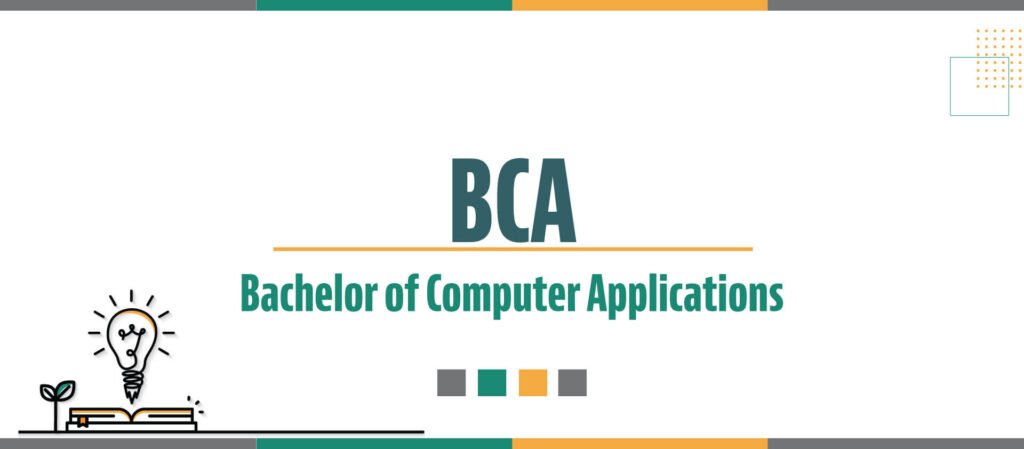The Bachelor of Computer Applications (BCA) is an undergraduate degree program that offers students an opportunity to gain comprehensive knowledge in the field of computer science and applications.
It is a three-year course designed to provide students with a strong foundation in programming, software development, networking, and database management, among other IT-related areas.
Aimed at students aspiring to build a career in Information Technology (IT), BCA is an ideal stepping stone for those looking to pursue advanced degrees like Master of Computer Applications (MCA) or jumpstart their professional careers in the rapidly growing tech industry.
BCA Admission Process
The admission process for the BCA program generally involves two main routes: merit-based and entrance exam-based admissions. Here’s how the process works:
Eligibility Criteria
Educational Qualification: To apply for a BCA program, candidates must have completed their higher secondary education (10+2) in any stream, although candidates from a science background (with subjects like Mathematics, Computer Science, or Information Technology) are often preferred.
Minimum Marks: Most institutions expect candidates to have secured at least 50% to 60% in their 10+2 exams. Some prestigious colleges or universities may have a higher percentage requirement, while others may offer relaxation to students from reserved categories.
Entrance Exams
Many universities and colleges conduct entrance exams for BCA admissions. These exams assess a candidate’s knowledge in areas like logical reasoning, mathematics, computer fundamentals, and general aptitude. Some popular entrance exams include:
IPU CET (Indraprastha University Common Entrance Test)
BHU UET (Banaras Hindu University Undergraduate Entrance Test)
CUCET (Central Universities Common Entrance Test)
However, some institutions offer direct admission based on the candidate’s performance in the 10+2 exams, and others may select students through personal interviews or group discussions.
Counseling and Document Verification
Once a student qualifies in the entrance exam or merit list, they are called for counseling. During this phase, students can select their preferred institution based on their rank and availability of seats. Document verification is also carried out at this stage, where candidates submit relevant documents such as mark sheets, ID proofs, photographs, etc.
BCA Course Structure
The BCA program usually lasts for three years, consisting of six semesters. The curriculum is designed to offer both theoretical knowledge and practical skills in computer applications and technology. Below are some core subjects and their key focus areas:
Semester 1
- Computer Fundamentals: Basics of computer systems, hardware, and software components.
- Programming in C: Introduction to programming languages and concepts using C.
- Business Communication: Enhancing communication skills in professional environments.
- Mathematics I: Focus on discrete mathematics, algebra, and calculus.
Semester 2
- Object-Oriented Programming (OOP) with C++: Understanding concepts like classes, objects, inheritance, polymorphism, etc.
- Digital Logic and Computer Organization: Study of logic gates, circuits, and hardware architecture.
- Discrete Mathematics: Mathematical foundations required for computer science.

Semester 3 BCA
- Data Structures: Implementation of various data structures like arrays, linked lists, and trees.
- Database Management Systems (DBMS): Introduction to database design, relational databases, and SQL.
- Software Engineering: Basic principles of software development, life cycles, and methodologies.
Semester 4
- Web Programming: Learning front-end technologies like HTML, CSS, and JavaScript for web development.
- Computer Networks: Concepts of networking, protocols, and network security.
- Operating Systems: Understanding OS concepts, memory management, and process scheduling.
Semester 5
- Mobile Application Development: Introduction to creating applications for mobile platforms such as Android and iOS. Programming in Python: Introduction to Python, a versatile programming language.
- Software Testing: Techniques for testing software applications for bugs and performance issues.
Semester 6
- Cloud Computing: Introduction to cloud-based technologies and services.
- Artificial Intelligence: Basics of AI algorithms and machine learning techniques.
- Project Work: Students are required to complete a project related to their area of interest, often involving practical software or application development.
BCA Fees Structure
The fee structure for the BCA program can vary depending on the type of institution (government or private) and its location. On average, students can expect the following fee ranges:
Government Institutions: The annual fee for BCA in government colleges is usually between ₹10,000 to ₹50,000. Public universities generally offer more affordable fees compared to private institutions.
Private Colleges: In private colleges, the fees tend to be higher, ranging from ₹40,000 to ₹1,50,000 per year. Reputed institutions may charge more depending on the quality of infrastructure, faculty, and campus amenities.
In addition to tuition fees, students may need to pay for books, project work, laboratory fees, and other miscellaneous expenses.
BCA Duration
The BCA program is typically three years in duration, divided into six semesters. Each semester lasts about six months, with exams held at the end of every semester. The curriculum is structured to provide students with a balanced approach, combining theoretical concepts with practical skills required to succeed in the IT industry.
Career Opportunities After BCA
Upon completion of the BCA program, graduates can explore a variety of career opportunities in the IT sector and beyond. Some of the popular career paths include:
Software Developer: Design, develop, and maintain software applications.
Web Developer: Build and manage websites, web applications, and online platforms.
Database Administrator: Manage databases and ensure their security, integrity, and performance.
Network Administrator: Handle the design and management of networks and IT infrastructure.
System Analyst: Analyze system requirements, design IT solutions, and improve business processes.
Mobile Application Developer: Develop applications for Android, iOS, and other mobile platforms.
Graduates can also pursue higher education in MCA, MBA in Information Technology, or specialized certifications in fields like cloud computing, data science, and cybersecurity to enhance their skills and career prospects.